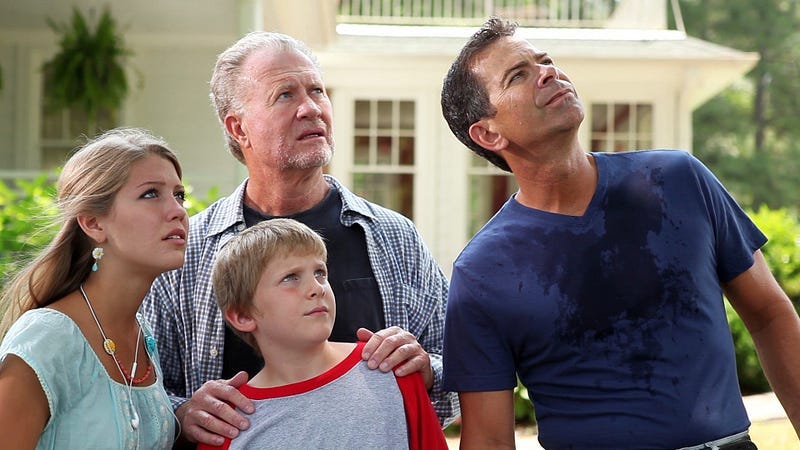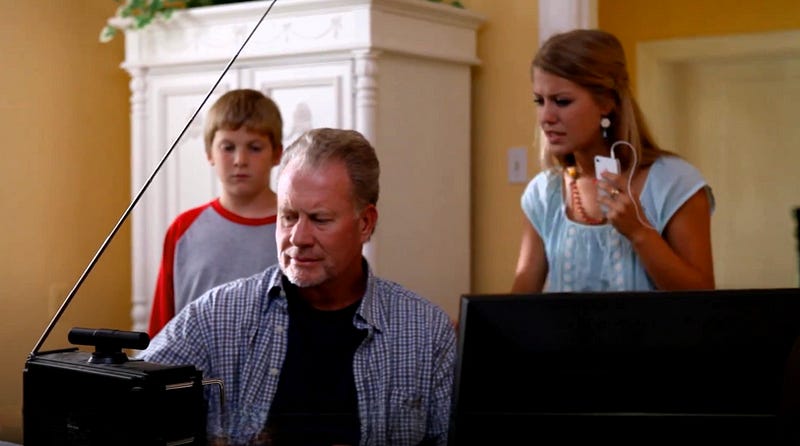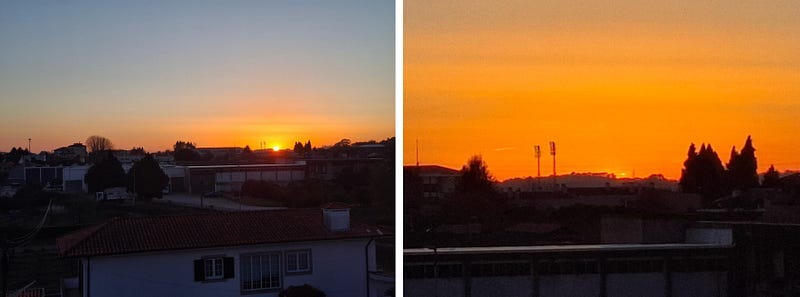Last week, the power went out without warning across the Iberian Peninsula, and with it all the little things we take for granted.
At first, I wasn’t too worried. We have outages all the time here where I live. Whenever there’s a storm, the lights flicker, and I know it’s a matter of time before we’re in the dark.
What got to me was realizing everything was down. I had never been cut off from phones, the internet, or cell service before.
I didn’t even have a working radio at home. If it wasn’t for my car radio, I would have no idea of what was happening.
Believe me when I say it, there’s nothing worse than losing the ability to reach out to those you love when the world goes dark.
I couldn’t call my mother. So I got in my car and rushed to her house while listening to the radio.
When I got there, I found her calm, tending to the flowers
She seemed surprised to see me.
I asked if she knew the power was out, but she didn’t think much of it.
So while everyone was rushing to ATMs, supermarkets, and gas stations, Mom tenderly cared for her carnations.
“The power is out, Mom.”
“I know, hon.”
“It’s not only the power mom, we have no phone, no internet.”
“Oh, really!? Don’t worry, dear, it will come back soon enough.”
“I don’t think so, Mom, they are saying it’s a total blackout in the Peninsula.”
My mother didn’t seem at all disturbed by the news.
“Relax, dear, it’s such a beautiful day, and everything will be okay.”
My mother is the wisest, kindest person I know. She’s been through hell and back and always has the right words at the right time.
Once again, she was spot on. There was nothing I could do, so why stress about it?
We stayed there for a while, soaking up the sun, admiring the flowers, and listening to the birds. Then we got to cooking our meal together.
During lunch, Mom shared one of her many pieces of wisdom.
“You know, hon, it’s like you don’t miss something ’til it’s gone.”
Mom probably didn’t even know she was quoting an old hippie song from the ’70s.
Joni Mitchell’s “Big Yellow Taxi has this rather insightful verse:
You don’t know what you’ve got ’til it’s gone
As a certified life coach, I know all too well how this is an axiomatic truth, deeply ingrained in our lives.
Until it’s Gone Syndrome
There are so many aspects of life we fail to appreciate when we’re so heavily immersed in our daily habits and all the stimuli technology exposes us to.
Pop culture has a name for this pseudo-psychological phenomenon. Some call it “until it’s gone syndrome.” This kind of feeling tends to show up most in our relationships with others, but it can also happen with things, and often in defining moments like a total blackout.
Last week, when the power went out, I felt a sense of total disconnection, like when we lose something or someone. Suddenly, what we took for granted feels valuable, but it’s no longer there, and the entire world crumbles around us like a house of cards, and we feel powerless and disoriented.
It didn’t take long for me to find my footing again and take action, but for a minute, the very essence of what I help others deal with was put to the test.
These moments of brief stupor happen more than you think and often without people even realizing it until it’s too late.
If you asked me the worst thing about being left in the dark?
Well, I guess, the sense of total helplessness.
In one moment, you are in control of your small world. In the next, you’re desperately trying to make sense of things you can’t control.
You can’t force things to happen. All you can do is look out for the people you care about.
The blackout lasted a few hours, but it could have lasted days. How would we have dealt with something bigger?
What if the rumors were true?
What if the blackout wasn’t just in Portugal, Spain, and Andorra? What if it hit all of Europe, the whole Northern Hemisphere, or even the entire world?
A moment of crisis
We have to go back nearly twenty years to find a power outage in Europe close to the one we had in April.
On November 4, 2006, a major outage hit Germany, France, Italy, Spain, Belgium, and Austria, affecting around 15 million people.
In the first minutes of the 2025 Iberian blackout, there were rumors of a cyber-attack.
Some people had no power or communications. I was one of them.
First thing that crossed my mind:
An electromagnetic pulse (EMP) event caused by a massive solar eruption.
The Sci-fi fan in me had already kicked in.
I remembered reading about what happened in 1859, when a massive coronal mass ejection from the sun hit our planet in what is known as the Carrington Event, as portrayed in Rob Underhill’s film.
Scenes from disaster movies like Solar Flare or Solar Crisis flashed through my brain synapses.

Later, when I was driving around town, I realized how the absence of something we once took for granted can quickly give way to collective hysteria, revealing the darker sides of our humanity.
The way people rushed to the nearest gas station, ATMs, or ran to the store to stockpile stuff they didn’t need shows we’re becoming more selfish and less caring as a society.
A tendency to schadenfreude
What I saw made me think of a kind of schadenfreude, the twisted pleasure which can lead some to rejoice in other people’s misfortune. Amid the chaos and panic, our social conscience fades, and selfishness reigns.
I saw people shoving to get the last flashlight and hoarding cans and jugs of water, which many tried to return to the stores the next day to make the situation even more histrionic.
What do you think you would do in a similar situation when you know nothing about what’s happening?
Would you look for the people you care about the most? Or run to the nearest ATM to withdraw money for gas and toilet paper?
Fortunately, it was all just a scare. But what if I was wrong, and this would have lasted for days and not hours? I let you ponder it, and do get back to me in the comments.
Life in a small provincial town has some advantages in these crises, and might help explain my calmness. Traffic wasn’t chaotic because we don’t have traffic lights, and there are plenty of roundabouts at intersections.
Although I live in an apartment where everything runs on electricity, my mother and my girlfriend live in villas with a well, and if the water supply is interrupted, they have a manual water pump, and the small gardens always have enough vegetables for a soup.
And so, if the blackout lasted days instead of hours, life would go on, and the things we had momentarily lost would be replaced by other things which are just as important, if not more so, and which so often go unnoticed.
When the power went out, everything stopped. In the sudden stillness, I felt a deeper kind of disconnection. It forced me to confront what we take for granted every day, and when it’s gone, our true nature surfaces.
There was panic, yes, but behind it, there was a certain subliminal satisfaction in watching other people’s misfortune and, in it, a reflection of our moral and ethical downfall.
In moments of crisis, our most basic instincts rise to the surface, and not all of them are noble.
There’s something uncomfortable we rarely admit: we do not just whine about what is gone. Some of us will savor the spectacle of others’ demise.
So, I’m with Noam Chomsky when he says, “the times are too difficult and the crisis too severe to indulge in schadenfreude.”
It’s in times like these we need to be more connected.
A growing need for connection
Together we grow, divided we fall. More interconnection is always the best way forward in so many aspects of life.
Moments of crisis can be turned into moments of growth. Chaos is not a pit, it is indeed a ladder.
They help us get our priorities straight.
As Kristina Ruby, secretary general at Eurelectric, Europe’s electricity industry association, said: “The blackout was a wake-up call. It showed that the need to modernize and reinforce Europe’s electricity grid is urgent and unavoidable.”
The recent blackout was indeed a wake-up call, and the most effective measure to ensure this doesn’t happen again rests in establishing strong interstate connections, which may act as backups, so the Iberian Peninsula will no longer be a sort of “energy island” in Europe.
So we need to improve the security of the electricity supply by investing in Projects of Common Interest, like the Bay of Biscay interconnector linking Spain to France project.
Commissioned for 2025, the new electricity line needs to be implemented as soon as possible, as it will nearly double the interconnection capacity between Spain and France, increasing it from 2,800 MW to 5,000 MW.

So, enjoy what you have; you will miss it when it’s gone. There will always be things you can’t control, and more events like the Iberian Blackout are bound to happen in the future.
As Herodotus once said, “there is strength in numbers.” So the best thing we can do is to work together so we are better prepared to face whatever life throws our way.
Rui Alves is a language teacher, published author, international book judge, and publisher. He runs Alchemy Publications and serves as editor-in-chief for Engage on Substack, Life Unscripted, Musicverse, Writelicious, The Academic, Portugal Calling, Engage on Medium, Rock n’ Heavy, Beloved, Zenite, Poetaph, Grind, and Babel.
This article appeared first on Portugal Calling.








This happened in eastern North America in 2003. Look up a map of Canada and USA for August 14, 2003 and you will see a big dark blob on the right hand side. Some people were without electricity and other services for a week, some like me just for 24 hours. My big scary moment was driving home from work - and there was NO radio service on any station. One station came back on the air after about 15 minutes, a classical station which had a large broadcast area so a very strong signal. I was very glad to be on my way home and not to have to drive back to work the next day. The school where I taught lost their power for about 36 hours so no classes were held. All the residents of my condo complex came out into their yards and chatted with their neighbours, and admired the dark starry sky.
Two thumbs up and clapping over here in the Pacific Northwest of Washington state Rui.
Not only for your well-written and informative article, but also as a wake-up call for all of humanity.
Bottom line is we need to realize the stress we feel around having steady resources is also demanding on Earth. And non-sustainable.
You're right about not knowing what we have until it's gone. I came of age with Yellow Taxi and was a devoted Flower child, budding into Hippie. I took note of Joni's cautionary verse and decided to walk with a light footprint on Gaia. I learned to work with nature instead of trying to control it. That's a lost cause.
It's easier to convert your home to solar than ever before. My husband and I built a solar home in Seattle. Everyone thought we were nuts because it was overcast and not the right climate for solar gain. Our meter steadily spun backward. We not only paid our use, but the city paid us for our overflow. We gave an open house solar tour. Within the next two years, half the homes in our neighborhood converted to solar.
We left the city and built an off-grid, solar home in the San Juan Islands bordering Canada. We have solar panels installed high up in strong fir trees. We've been here five years and occasionally our WIFI quits and has been awol up to two days.
My solution is to make a damn good latte and sit on the deck with a few of those SUN magazines I've been wanting to read.
Strangely, I don't give squat about internet fasting and remember how much I loved a good read. Great article!
🔋🎛️☀️🌲🏡⚡️👏